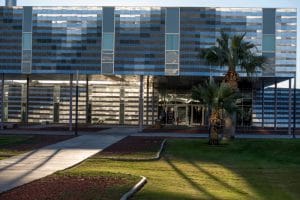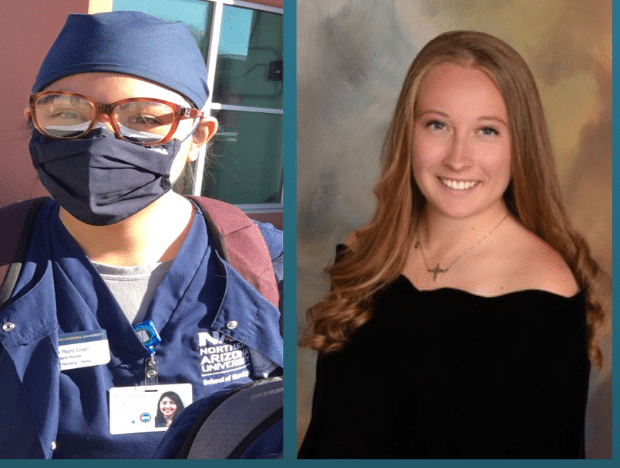Nursing students at Northern Arizona University-Yuma have stepped up in the community’s fight against COVID-19, with a third of enrolled students volunteering to give vaccinations.
The vaccination volunteering on Jan. 26, which is the latest effort in the partnership between the university and the health care community in southern Arizona, started with an email to Jason Bradley, an assistant clinical professor and program coordinator of the NAU-Yuma nursing program. It was 4:28 p.m., and the email asked for volunteers who could be available at 9 a.m. the next day.
Despite that, eight NAU-Yuma nursing students were at the Yuma County Public Health Services District (PHSD) the next morning, masked and scrubbed up and ready to vaccinate Yuma residents who were eligible for the vaccine.
“All of this requires that our students provide patient education, they do screenings and they give shots,” Bradley said. “They’re really putting their education into action.”
Juliana Razo Lugo was one of those students. She’s graduating this spring and saw the vaccination clinics as a way to practice her skills in administering injections while also helping the community. She found herself surrounded by a range of health care providers, including other students.
“I was surprised when one of the nurses said she had already gone through this process back in 2010 with the H1N1 virus, which made me realize that this will not be the last time I experience something like this,” she said.
The nursing program has longstanding ties with the Yuma Regional Medical Center, the PHSD and Arizona Western College, so participating in community health events like this is not unusual. Bradley actually reached out to Yuma County in December to see how the nursing students could help. That made him the first contact at a last-minute cancellation. Over the course of several clinics, close to 30 nursing students have gotten the chance to volunteer.
Because of the nature of these clinics, almost all of which happened before the semester started, none of the nursing students have gotten any academic credit for these clinics. With more time to plan, these clinic experiences are worked into the curriculum. Bradley is planning to make that happen as clinics become more frequent and more predictable, including getting students who are engaged in virtual learning participating in the clinics, as they would in a normal year.
But this is not a normal year. Professors also changed their first-year curriculum so students learn how to administer shots in the first few weeks, instead of waiting halfway through the semester. They’re doing all they can to help prepare nursing students to be able to jump in and help their community as much as possible throughout the pandemic.
On the other end of their education, students are jumping into clinical work early. Last fall, Bradley asked if any fifth-semester students wanted to start their final semester early; Yuma Regional Medical Center needed as many health care providers as possible. Ten started their preceptor work a month early to help fill that need.
It’s hard; no one will say differently. But the sense of purpose motivating everyone in the health care community is making a difference.
“I have seen this myself and heard from the students—the vibe, the energy, the atmosphere of these clinics is positive,” Bradley said. “You can just feel that everyone, while frustrated that more aren’t getting vaccinated, has a general sense of optimism and positivity around those clinics. I know they see that, they feel that, they’re part of it.”
That’s been the experience of Maegan Collins, who’s early in her nursing program. Being able to participate in these clinics helped her feel like a real nurse, she said, and she liked seeing how happy people were to get the vaccine.

“I volunteered to administer vaccines because I really wanted to practice my skills, but I also wanted to help the nurses in the community,” Collins said. “I know with this pandemic the nurses are being run ragged, especially here in Arizona, with the rates being so high. I just wanted to be able to do what I could to maybe give them a break.”
She’s more confident in her abilities now, she said, and not just in giving shots. She got first-hand experience in the challenges inherent to health care when a patient fainted after receiving the shot. She’d passed out when getting vaccines before, so the staff was prepared, and the patient was fine. But it wasn’t what Collins expected when she volunteered.
Bradley, who is a mental health professional, is keeping a closer-than-normal eye on the students, who are feeling the crunch not only of a drastically different educational experience than any planned on but also preparing to work in health care during a global pandemic. He has seen negative impacts and continually stresses the importance of caring for their mental health.
The students, even though they were glad to be doing something to help, agreed that it wasn’t easy.
“To be a part of this is sad, honestly; so many people are sick and dying,” Collins said. “I never thought in my life I would experience a global pandemic. But I am also very grateful to be able to participate in helping to possibly stop the pandemic.”
“It is satisfying to think that I was part of a chapter in history, but a chapter in history I wish closes soon,” Razo said.
Heidi Toth | NAU Communications
(928) 523-8737 | heidi.toth@nau.edu




